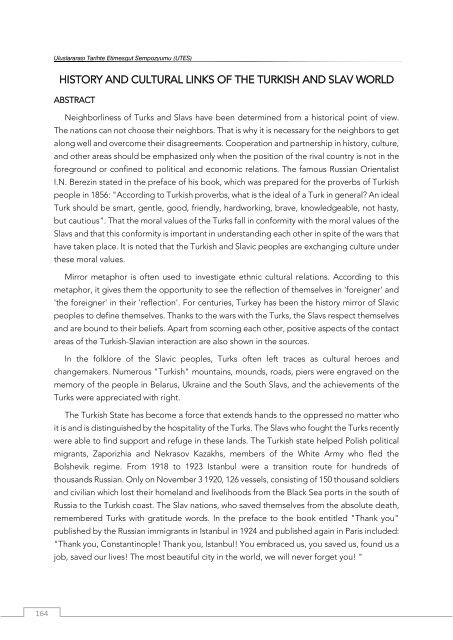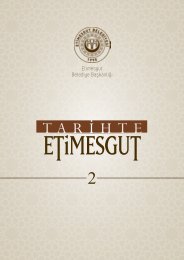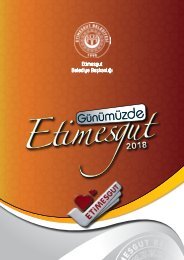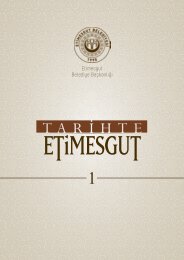BİLDİRİ ÖZETLERİ / ABSTRACT BOOK
You also want an ePaper? Increase the reach of your titles
YUMPU automatically turns print PDFs into web optimized ePapers that Google loves.
Uluslararası Tarihte Etimesgut Sempozyumu (UTES)<br />
HISTORY AND CULTURAL LINKS OF THE TURKISH AND SLAV WORLD<br />
<strong>ABSTRACT</strong><br />
Neighborliness of Turks and Slavs have been determined from a historical point of view.<br />
The nations can not choose their neighbors. That is why it is necessary for the neighbors to get<br />
along well and overcome their disagreements. Cooperation and partnership in history, culture,<br />
and other areas should be emphasized only when the position of the rival country is not in the<br />
foreground or confined to political and economic relations. The famous Russian Orientalist<br />
I.N. Berezin stated in the preface of his book, which was prepared for the proverbs of Turkish<br />
people in 1856: "According to Turkish proverbs, what is the ideal of a Turk in general? An ideal<br />
Turk should be smart, gentle, good, friendly, hardworking, brave, knowledgeable, not hasty,<br />
but cautious". That the moral values of the Turks fall in conformity with the moral values of the<br />
Slavs and that this conformity is important in understanding each other in spite of the wars that<br />
have taken place. It is noted that the Turkish and Slavic peoples are exchanging culture under<br />
these moral values.<br />
Mirror metaphor is often used to investigate ethnic cultural relations. According to this<br />
metaphor, it gives them the opportunity to see the reflection of themselves in 'foreigner' and<br />
'the foreigner' in their 'reflection'. For centuries, Turkey has been the history mirror of Slavic<br />
peoples to define themselves. Thanks to the wars with the Turks, the Slavs respect themselves<br />
and are bound to their beliefs. Apart from scorning each other, positive aspects of the contact<br />
areas of the Turkish-Slavian interaction are also shown in the sources.<br />
In the folklore of the Slavic peoples, Turks often left traces as cultural heroes and<br />
changemakers. Numerous "Turkish" mountains, mounds, roads, piers were engraved on the<br />
memory of the people in Belarus, Ukraine and the South Slavs, and the achievements of the<br />
Turks were appreciated with right.<br />
The Turkish State has become a force that extends hands to the oppressed no matter who<br />
it is and is distinguished by the hospitality of the Turks. The Slavs who fought the Turks recently<br />
were able to find support and refuge in these lands. The Turkish state helped Polish political<br />
migrants, Zaporizhia and Nekrasov Kazakhs, members of the White Army who fled the<br />
Bolshevik regime. From 1918 to 1923 Istanbul were a transition route for hundreds of<br />
thousands Russian. Only on November 3 1920, 126 vessels, consisting of 150 thousand soldiers<br />
and civilian which lost their homeland and livelihoods from the Black Sea ports in the south of<br />
Russia to the Turkish coast. The Slav nations, who saved themselves from the absolute death,<br />
remembered Turks with gratitude words. In the preface to the book entitled "Thank you"<br />
published by the Russian immigrants in Istanbul in 1924 and published again in Paris included:<br />
"Thank you, Constantinople! Thank you, Istanbul! You embraced us, you saved us, found us a<br />
job, saved our lives! The most beautiful city in the world, we will never forget you! "<br />
164






